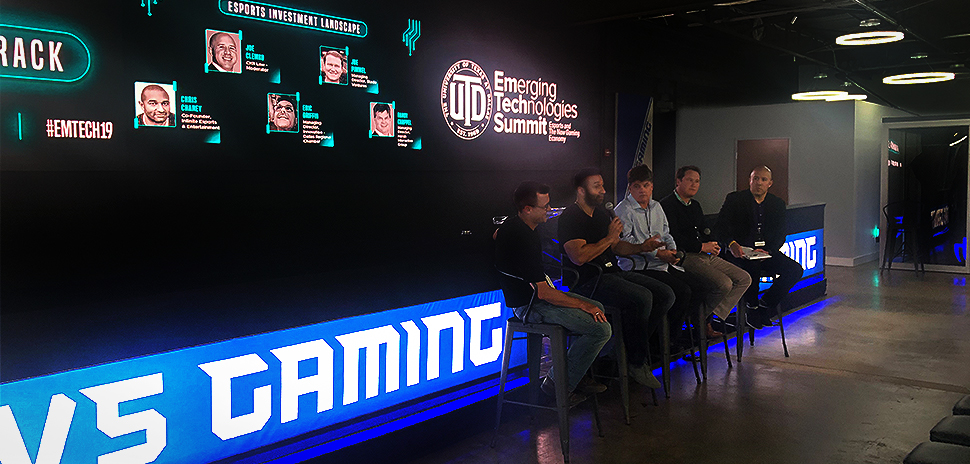Esports, a trailblazing tech trendsetter, has the potential to establish itself as a major player in the growing tech industry. The question now is—how can North Texas startups stand out and grab the industry by the controller?
Panelists from Infinite Esports & Entertainment, Stadia Ventures, Hersh Interactive Group, and the Dallas Regional Chamber gathered at Mavs Gaming Center for UTD’s Emerging Technologies Summit in April to talk through the ins and outs of the industry and answer frequently asked questions.
The industry’s growth is inspired by the introduction of tournaments, marketing campaigns, investors, and the creation of competitive teams. An overflow of startups, brands, and sponsors have begun embracing the industry. Today, the success of esports in North Texas is second only to Los Angeles’ market.
Joseph Clemko, Senior Attorney at CKR Law, moderated the discussion:
What makes the North Texas region attractive for the esports industry?
Joe Pimmel, managing director at Stadia Ventures: “For us, the Dallas-Fort Worth region was the perfect intersection of sports, tech, and sports business in general. [There’s] no better place for us to put those roots down, where you’ve got nine sports franchises in the area, in addition to a lot of the gaming franchises as well.”
Randy Chappel, managing director at Hersh Interactive Group: “Dallas has clearly emerged, in my opinion, as the second biggest esports hotspot certainly in the country. Los Angeles is first, but there’s a huge history of gaming [in the region]. Quake Con was here and, if you go far enough, the microchip processor was invented here. Huge esports events have been held here over the years: first Counter-Strike, then Call of Duty. One of the first attempts to make an esports league started here with CPL (Cyberathletic Professional League) 20 years ago—way ahead of its time.”
Chris Chaney, co-founder of Infinite Esports & Entertainment: “The opportunity to build something significant here is unprecedented. With all the history being alluded to, we should all recognize that Dallas has been made for esports, and in many ways, this is the resurgence of Dallas esports coming full circle in this new age. We have the opportunity to build something really unique.”
Eric Griffin, managing director of innovation at the Dallas Regional Chamber: “Dallas is about the business of business. Dallas is a business-friendly place. When you come here to do business—if you succeed, we’re all going to succeed.”
How are sponsorships and interactions with brands shaping up in your industry?
Pimmel: “GameStop is based here in town and is an obvious candidate for all of us to be talking to. We love the fact that they stayed ‘Switzerland’ a little bit. I mean they want to support all the teams in the area. I think that it’s worked out great.”
“We have a big sponsorship with Jack in the Box and Main Event. All these companies know that they have an audience out there. And we’re starting to get over where we spent the last two years, you know, trying to explain what esports is and why it matters. Now the next hurdle is that there are all these teams and leagues and different places and how do I know what to invest in.”
Chappel: “All these games that we play are someone’s intellectual property and that fundamentally affects what kind of things you can do, what kind of data you can use. So that affects the kinds of business plans you can have in different ways in a lot of industries.”
“Also there are a lot of deals. There are a lot of big companies in this business apart from [the] big publishers that you know, like Activision, Blizzard, Riot, and now Epic. And now the big animal on the screen in businesses is Twitch. I see a lot of business plans about ‘how we’re going to do this to make Twitch better.’ But then you have to wonder about Twitch’s reaction to that, and how does that affect it.”
What can esports startups do to get on the investment radar?
Pimmel: “For us, we look for companies that can have direct applicability to our network partners. For example, somebody that can immediately plug into our team. So if we can’t take a company immediately to 15 to 30 of our partners, it’s going to be hard for us to want to get behind something like that.”
Cheney: “A lot of startups are replicating what’s already out there, they all kind of look the same. From an entrepreneur’s perspective, don’t just get into the space and look at someone’s business model, copy it, and try to do it 2 percent better, 5 percent better.”
What helps founders and investors find success in media and investment?
Pimmel: “Knowledge of your customer: When someone can speak very intelligently about the audience they’re going after.”
Chappel: “To be honest, make a really good first impression because almost every company that we’re involved with, the first things they say is,’Can you give me an Overwatch League? Can you give me this?’
Chaney: “I’ve had good experiences with startups that have taken feedback well, especially thoughtful feedback. ‘Does it make sense?’ ‘Is it, in fact, something they could change or should change and adjust?’ Because what that tells me is that that kind of team is going to be nimble. When they hit roadblocks, they’ll be able to maneuver around them or somehow pivot.”
What do you say to those who worry about the longevity of the industry?
Pimmel: “The industry is clearly here to stay. It’s not a fad. It’s not just something that will pass by in a few years. This is the future of entertainment. That’s the underlying belief that esports is the future or a key part of the future of entertainment.”
Chappel: “There’s no such thing as somebody under the age of 30 who’s not a gamer, it’s just a matter of degree. You’re either playing on your iPhone, or you’ve got a serious gaming rig at home. It’s a real source of entertainment, and it’s a spectator sport too.”
Griffin: “We are putting our weight behind four specific technologies. And there’s more that we can add to it: Artificial intelligence, internet of things, extended reality, and blockchain technologies. I would look for startups that are trying to look at the intersections of those technologies and how they might improve gaming in general, esports specifically, and how to make it a better experience for everyone.”
Panel comments have been edited for brevity and clarity.![]()
Get on the list.
Dallas Innovates, every day.
Sign up to keep your eye on what’s new and next in Dallas-Fort Worth, every day.




























